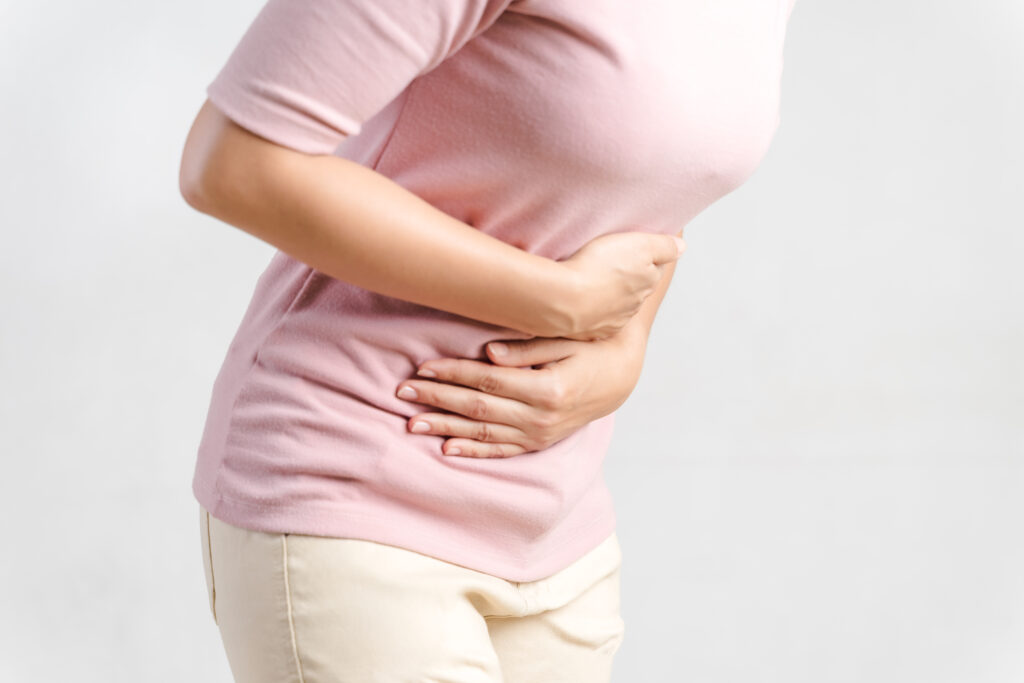Table of contents
- What are the Symptoms of Endometriosis?
- 20 Symptoms of Endometriosis:
- 1. Painful Periods
- 2. Pain During Intercourse
- 3. Heavy Bleeding
- 4. Fertility Issues
- 5. Fatigue
- 6. Cramps
- 7. Bloating
- 8. Vomiting
- 9. Nausea
- 10. Constipation
- 11. Diarrhea
- 12. Rectal Bleeding
- 13. Pain with Bowel Movement
- 14. Rectal Fullness
- 15. Blood in Urine
- 16. Pain with Urination
- 17. Excessive Urination
- 18. Flank Pain
- 19. Back Pain
- 20. Leg Pain
- Other Common Symptoms of Endometriosis:
- Recognizing Signs of Endometriosis: Why Early Diagnosis Matters
What are the Symptoms of Endometriosis?
Endometriosis symptoms can vary in intensity and don’t always correlate with the extent of the disease. Some women may have minimal symptoms, while others experience significant discomfort. If you experience these symptoms, particularly if they worsen during your menstrual cycle, it’s important to consult a healthcare provider for proper diagnosis and treatment options.
Endometriosis is a chronic, sometimes debilitating condition. Endometriosis means tissue similar to the lining of the uterus (the endometrium) grows outside the uterus. It affects 1 in 10 women between 15-50 and other genders. While there is no cure for endometriosis, understanding the common and uncommon signs and symptoms can help you get an earlier diagnosis and manage your symptoms more effectively.
20 Symptoms of Endometriosis:
1. Painful Periods

The most common endometriosis symptom is pain during or around periods ranging from mild to extreme. This pain may start before or after your period begins. It may be localized in the pelvic region or spread to other parts of your body. The pain may also become worse over time if endometriosis is left untreated.
2. Pain During Intercourse
Intercourse may be uncomfortable or even painful for individuals with endometriosis, a condition that can also lead to endometriosis pain after orgasm. This specific type of discomfort is known as dyspareunia, which often occurs because of an endometriosis mass in the pelvis and around the vagina or due to the adhesions of endometriosis within the pelvic region. Adhesions, which form when scar tissue causes organs to bind together, prevent these organs from moving freely against each other as they normally would during intercourse, contributing to the pain experienced.
3. Heavy Bleeding
Women with endometriosis often experience heavy bleeding during their periods. Heavy bleeding means they must change their pads or tampons more frequently than normal—as often as every hour—or pass large blood clots during their menstrual cycle. Some women also experience spotting throughout their cycles and bleeding between cycles due to endometriosis-related changes in hormones. This heavy bleeding or spotting can be a sign of adenomyosis, which is very common in endometriosis patients.
4. Fertility Issues
Endometriosis and Infertility are closely connected, as endometriosis can lead to fertility challenges for some women. The inflammation, adhesion, or mass effect of endometriosis lesions on key reproductive organs like the ovaries, fallopian tubes, and the uterus can result in infertility. The struggle with endometriosis and infertility can evoke a spectrum of emotions, including anger, sadness, and frustration, as individuals face the complex challenges associated with these conditions.
5. Fatigue
Fatigue, characterized by a lack of energy and motivation, stands as one of the most prevalent symptoms associated with fatigue and endometriosis.
Are you experiencing symptoms of fatigue and endometriosis? It’s crucial to consult with an expert in the field. Reach out to:
Dr. Andrea Vidali , Endometriosis Specialist and Reproductive Endocrinologist
Dr. Steven Vasilev , Endometriosis Specialist, Integrative Medicine Specialist
6. Cramps
It might start before a period and last several days. Patients describe it as stabbing, searing, debilitating pain associated with endometriosis and stomach cramps.
7. Bloating
Endo Belly is a term used to describe the severe bloating experienced by individuals with endometriosis. This condition results in the abdomen becoming swollen, often causing discomfort and pain. Bloating is a complaint in 82.8% of patients with endometriosis, and endo belly is one of the most common manifestations. Inflammation, bacterial, immunologic, and hormonal changes might be the likely reasons for endo belly.
8. Vomiting
Vomiting might result from endometriosis’s mass effect and hormones on the gastrointestinal tract. It could also be secondary to severe pain and discomfort.
9. Nausea
Severe pain and cramps can lead to nausea. Also, with heavy bleeding, you may feel lightheaded or dizzy during your periods which can lead to nausea.
10. Constipation
Generally, constipation means the passage of small amounts of hard, dry stool, usually fewer than three times a week.
Chronic constipation in women with endometriosis varies from 12% to 85%. Constipation can result from multiple causes. These causes for constipation include inflammation, scar tissue, damage to pelvic autonomic nerves, pelvic floor muscle dysfunctions, and hypertonic (too much muscle tone) pelvic floor muscles.
11. Diarrhea
Diarrhea means loose, watery stools that occur more frequently than usual. Endometriosis and diarrhea is most likely related to high patient anxiety and hormonal imbalances such as increased prostaglandins.
12. Rectal Bleeding
Deep infiltrating endometriosis of the colon can cause cyclic or midcycle rectal bleeding.
13. Pain with Bowel Movement
Bowel endometriosis, particularly deep infiltrating endometriosis of the colon, can lead to painful bowel movements. Additionally, lesions located behind the rectum or anus can similarly result in painful bowel movements, contributing to the discomfort associated with bowel endometriosis.
14. Rectal Fullness
Deep infiltrating endometriosis of the colon can cause the feeling of rectal fullness. Similarly, lesions behind the rectum or anus can cause rectal fullness.
15. Blood in Urine
Deep endometriosis lesions in the bladder and ureter can cause bloody urine during the period or off cycle.
16. Pain with Urination
It is also known as “dysuria.” Deep infiltrating endometriosis of the bladder can cause pain with urination (dysuria).
17. Excessive Urination
It is also known as “frequency.” Deep infiltrating endometriosis of the bladder can cause excessive urination, AKA frequency.
18. Flank Pain
Endometriosis lesions impacting kidneys and ureters can lead to pain in the flank. Also, other pelvic sidewall lesions can have similar flank pain.
19. Back Pain
Low back pain can be present due to the direct impact of endometriosis lesions on lumbosacral bones or nerve roots. Some other explanations of this pain include referral pain of visceral pelvic pain, hypersensitization, and adhesion in the pelvic area that impacts low back joints.
20. Leg Pain
Leg pain occurs due to nerve inflammation or hypersensitization. Nerve inflammation happens due to endometriosis covering nerves such as the sciatic nerve. Another reason for nerve inflammation is the presence of endometriosis in distant places, such as ovaries and pelvic side walls, that compress and inflame nerves.
Other Common Symptoms of Endometriosis:
Ovarian Mass
Endometriosis of ovaries can result in endometrioma. An ovarian endometrioma is a cyst that contains endometriosis tissue and a thick, brown, tar-like fluid. Some may call it a “chocolate cyst.” It can grow to 10-15 cm and present with a mass in the abdomen.
Postcoital Bleeding
Bleeding after sex, known as postcoital bleeding, can result from endometriosis lesions in the uterine cervix. With penetration, the endometriosis tissue on the cervix becomes irritated and wounded and starts bleeding.
Recognizing Signs of Endometriosis: Why Early Diagnosis Matters
There are many other signs and endometriosis symptoms associated with endometriosis, including shortness of breath, headaches, depression, and anxiety. Suppose you experience any individual or combination of these symptoms regularly. In that case, you must seek medical advice from your doctor so that they can properly diagnose and treat your condition accordingly. An early diagnosis can help you manage your symptoms more effectively, so don’t hesitate to speak with your doctor if you think you suffer from this condition.





i get severe Sharp pain on my left lower side of my abdomen and can’t bend durin g my period what medication would help?
Endometriosis, cloaked in layers of physical pain and emotional turmoil, punctuates the profound intricacies of women’s health. Through its vast spectrum of symptoms, from debilitating pelvic pain to the nuance of postcoital bleeding, we’re reminded of the resilience of those enduring this condition. The confluence of pain, whether radiating to the back or echoing in the legs, couples with more elusive symptoms like fatigue, underlining the relentless nature of endometriosis. The emphasis on understanding not just the physiological, but the emotional and psychological ramifications of this condition, underscores the imperative to champion early diagnosis and compassionate care. Each symptom, be it overt or covert, is a testament to the silent battles waged daily by countless individuals.